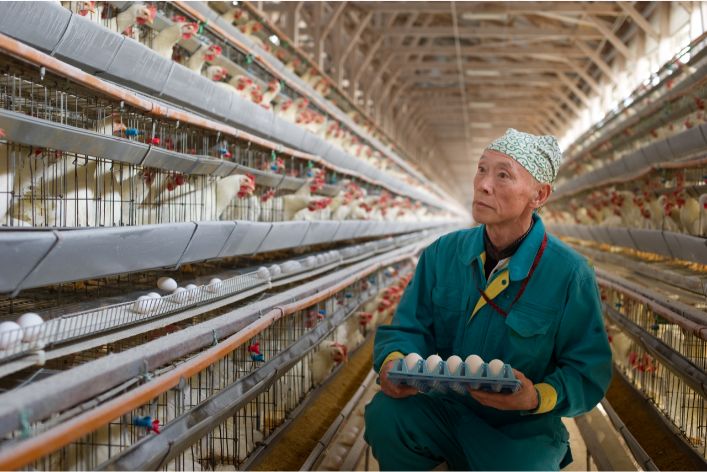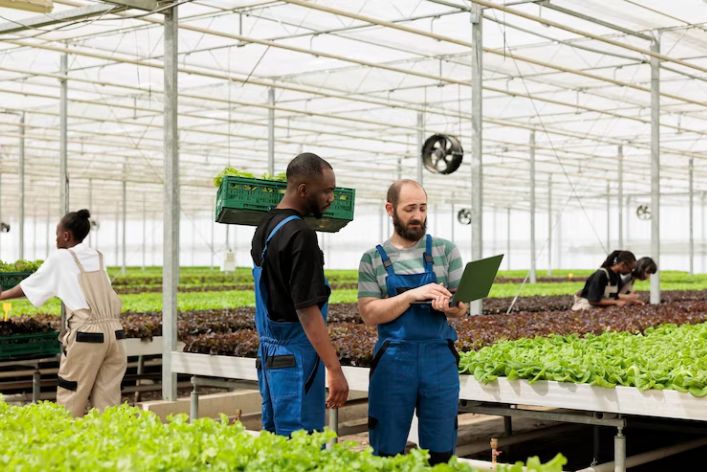Introduction
Nigeria, a country with an economy heavily reliant on oil production, is gradually turning its attention towards agriculture as a means of diversifying its economic portfolio.
Agriculture contributes significantly to Nigeria’s Gross Domestic Product (GDP) and remains a vital source of employment for millions of Nigerians.
The success of agriculture in Nigeria depends significantly on key agricultural professions, without which the industry cannot thrive.
These professions include agronomists, agricultural engineers, livestock farmers, and soil scientists, among others. These professionals are responsible for providing expert knowledge and skills in various stages of the agricultural value chain, from seed selection to post-harvest management.
Their services are crucial to the productivity and competitiveness of the sector. This blog post aims to highlight the importance of key agricultural professions in Nigeria’s economy, and how they help in boosting the sector’s growth and development.
We argue that while agriculture has the potential to improve Nigeria’s economy, this potential can only be realized through the efforts of key agricultural professionals who bring innovation, technology, and techniques to the industry.
Read: Paving Your Career Path: Agribusiness Roles in Nigeria
Key Agricultural Professions: Boosting Nigeria’s Economy
Agriculture is a vital sector that contributes immensely to the growth and development of Nigeria’s economy. The sector is not only a source of food and raw materials but also a provider of employment to millions of Nigerians. However, the success of the agricultural sector is dependent on the different professionals that are involved in it. Let’s discuss key agricultural professions, their importance to the agriculture sector, and their impact on Nigeria’s economy.
Farmers
Farmers are the backbone of the agricultural sector. They are responsible for planting, nurturing, and harvesting crops or rearing animals for consumption or sale.
They work hard by dedicating their time and resources to ensure that food is readily available for the population. Farmers contribute to the country’s economy by producing food that is necessary for the sustenance of life and by providing raw materials for industrial use.
Agronomists
Agronomists are professionals who provide technical support to farmers. They offer advice on soil management, crop selection, and planting techniques. Agronomists also assist farmers in analyzing their soil, water, and nutrient requirements.
They are an essential part of the agricultural sector as they help farmers boost their yields and solve crop production-related problems. They have a considerable impact on the economy as they ensure that crops are produced in abundance, making the country self-sufficient in food production.
Veterinarians
Veterinarians are professionals who specialize in the health of livestock. They provide medical treatment, conduct medical procedures, and monitor the health of animals.
They are involved in preventing and diagnosing diseases that affect animals, ensuring that they remain healthy and productive. Veterinarians are vital to the agricultural sector as they promote animal health, which, in turn, makes livestock farming viable.
They also prevent the spread of diseases, which could lead to the loss of millions of dollars in revenue.
Agricultural Engineers
Agricultural Engineers are professionals that provide technical support to the sector. They design machinery and tools that help farmers increase their productivity.
They also build and repair necessary infrastructure, such as roads, irrigation systems, and storage facilities. Agricultural Engineers play a crucial role in the development and establishment of sustainable farming practices.
Their work makes agriculture more efficient, which results in higher yields, increased profits, and ultimately, boosting the economy.
Extension Agents
Extension agents are intermediaries between the agricultural experts and the farmers. They are professionals who provide farmers with the necessary information on new agricultural technologies, research, and innovations.
They assist farmers in implementing best practices and help them access markets. Extension agents are essential to the agricultural sector as they bridge the gap between research institutions and farmers.
They play a considerable role in promoting the adoption of new technologies and helping farmers make informed decisions.
In essence, key agricultural professions are essential to the success of the agricultural sector and, ultimately, the growth of Nigeria’s economy.
Farmers, Agronomists, Veterinarians, Agricultural Engineers, and Extension Agents all play vital roles in ensuring that sustainable farming practices are employed.
Their collective contributions to the sector result in higher yields, increased profits, and ultimately, boosting the country’s economy. With the right support and investment, these professions can make significant strides resulting in Nigeria becoming a food basket of the world.
Read: Exploring Top 10 Lucrative Agriculture Professions in Nigeria
Delve into the Subject: Overcoming Common Diseases in Nigerian Poultry Farms
Challenges Facing Agricultural Professions
Agriculture is a vital sector for economic growth and development in any country. In Nigeria, the agricultural sector is facing various challenges that hinder its progress and potential to contribute effectively to the economy.
Inadequate Funding
The agricultural sector in Nigeria has been grappling with inadequate funding for a long time, which has been a major setback for the industry’s development. The government’s budgetary allocation to the sector is usually less than what is required, which limits the capacity of the sector to achieve its potential.
Lack of Mechanization
The use of modern technology and machinery is critical to increasing productivity and efficiency in the agricultural sector. However, Nigerian farmers still rely heavily on manual labor and traditional farming practices, which limits their potential to produce more and achieve higher yields.
Pest and Disease Outbreaks
The agricultural sector is vulnerable to pest and disease outbreaks that can cause significant damage to crops and livestock.
Nigeria has experienced various outbreaks that have had devastating effects on the sector, such as the Fall Armyworm invasion in 2016, which affected maize production, and the Avian Influenza outbreak, which affected poultry production in 2021.
Impact of these challenges on the agricultural professions and the economy
Significant challenges plague the agricultural sector, influencing professions and the broader economy. Limited funding hinders job creation and overall production, exacerbating national poverty.
Farmers, lacking mechanization, often produce inefficiently, resulting in lower yields and income, deepening poverty within farming communities.
Pest and disease outbreaks have disrupted the livestock industry, causing production decline and subsequent price hikes, rendering food less affordable.
High production costs due to poor access to quality inputs, expensive energy, and inadequate irrigation facilities escalate food prices, worsening poverty.
Nigeria’s agricultural sector urgently requires attention. Adequate funding, mechanization improvements, and research and development investment could alleviate these issues.
Potential solutions include controlling pest and disease outbreaks, improving productivity, and creating more job opportunities within the sector.
In general, addressing these challenges is critical to unlock the sector’s potential to contribute effectively to the national economy.
Read: Midwifery in Nigeria: The Heroes of Maternal Health

Discover More: In-depth Look at the Livestock Value Chain in Nigeria
Solutions
Suggested solutions to the challenges facing agricultural professions
- Improve access to credit facilities: Agricultural professionals need access to credit facilities to boost productivity, but many of them do not have access to affordable loans. The government can collaborate with financial institutions to provide easy access to credit facilities for agricultural professionals.
- Encourage value addition: The government can encourage agricultural professionals to add value to their products by providing them with incentives and supporting the establishment of value-added processing centers.
- Improve infrastructure: Poor infrastructure is one of the major challenges facing agricultural professionals in Nigeria. The government can invest in improving transportation networks, storage facilities, and irrigation systems.
- Reduce post-harvest losses: A significant amount of food produced in Nigeria is lost due to poor storage facilities and inadequate transportation networks. The government can set up programs aimed at reducing post-harvest losses by providing better storage facilities and investing in transportation networks.
Call to action for government to provide adequate funding
The government needs to provide more funding for the agricultural sector to boost productivity and create more jobs. This can be done by increasing the budgetary allocation for agriculture and investing in research to improve agricultural practices.
Encouraging private sector investment in agriculture
The private sector can play a significant role in developing the agricultural sector in Nigeria. The government can encourage private sector investment by providing incentives, reducing bureaucracy, and creating a conducive environment for investment.
Training and support systems for farmers
Agricultural professionals need to be equipped with the skills required to improve productivity and compete in the global market. The government can provide training programs for farmers, extension workers, and other agricultural professionals.
Promotion of mechanization and modern technology in agriculture
Mechanization and technology enhance agricultural productivity, and reduce farming drudgery. The government should incentivize modern farming practices and invest in research for suitable technologies.
Boosting Nigeria’s economy through agriculture requires joint efforts from the government, private sector, and agricultural professionals.
The government must provide policies, incentives, funding, and infrastructure development.
Agricultural professionals should seize opportunities, collaborate with the private sector, and innovate. With adequate support, Nigeria’s agricultural sector can compete globally, create jobs, and boost the economy.
Read: Optometry in Nigeria: A Vision of Healthy Future
Conclusion
Key agricultural professions are vital to the growth and development of Nigeria’s economy. The importance of agricultural professions cannot be overemphasized, as they provide numerous benefits to the country.
Therefore, there is a need for support and investment in the agriculture sector to ensure that the potentials of these professions are fully harnessed.
The government should provide adequate financing and incentives to encourage more people to venture into the agricultural profession.
Also, there should be policies that protect farmers and support local agriculture, such as improving infrastructure, providing access to education, and promoting the use of advanced technology in agriculture.
If these measures are put in place, Nigeria can achieve rapid economic growth and development. Agricultural professions can contribute significantly to job creation, poverty reduction, and increased food security. With a growing agricultural sector, Nigeria can reduce its dependence on oil and diversify its economy, thereby making it less vulnerable to global economic fluctuations.
Therefore, it is essential for us as a nation to encourage the growth of key agricultural professions in Nigeria. Agricultural professions have the potential to revamp the economy and create significant opportunities for the nation’s people. With investment and support, we can transform the agricultural sector and boost economic growth significantly. The future of Nigeria’s economy should be agricultural.




